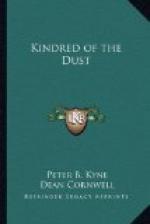Thus it came about that the little brass cannon was installed on its concrete base on the cliff. And when the flagpole had been erected, old Caleb Brent came up one day, built a little mound of smooth, sea-washed cobblestones round the base, and whitewashed them. Evidently he was a prideful little man, and liked to see things done in a seamanlike manner. And presently it became a habit with The Laird to watch night and morning, for the little pin-prick of color to flutter forth from the house on the Sawdust Pile, and if his own colors did not break forth on the instant and the little cannon boom from the cliff, he was annoyed and demanded an explanation.
III
Hector McKaye and his close-mouthed general manager, Andrew Daney, were the only persons who knew the extent of The Laird’s fortune. Even their knowledge was approximate, however, for The Laird disliked to delude himself, and carried on his books at their cost-price properties which had appreciated tremendously in value since their purchase. The knowledge of his wealth brought to McKaye a goodly measure of happiness—not because he was of Scottish ancestry and had inherited a love for his baubees, but because he was descended from a fierce, proud Scottish clan and wealth spelled independence to him and his.
The Laird would have filled his cup of happiness to overflowing had he married a less mediocre woman or had he raised his daughters as he had his son. The girls’ upbringing had been left entirely in their mother’s hands. Not so with young Donald, however—wherefore it was a byword in Port Agnew that Donald was his father’s son, a veritable chip of the old block.
By some uncanny alchemy, hard cash appears to soften the heads and relax the muscles of rich men’s sons—at least, such had been old Hector’s observation, and on the instant that he first gazed upon the face of his son, there had been born in him a mighty resolve that, come what might, he would not have it said of him that he had made a fool of his boy. And throughout the glad years of his fatherhood, with the stern piety of his race and his faith, he had knelt night and morning beside his bed and prayed his God to help him not to make a fool of Donald—to keep Donald from making a fool of himself.
When Donald entered Princeton, his father decided upon an experiment. He had raised his boy right, and trained him for the race of life, and now The Laird felt that, like a thoroughbred horse, his son faced the barrier. Would he make the run, or would he, in the parlance of the sporting world, “dog it?” Would his four years at a great American university make of him a better man, or would he degenerate into a snob and a drone?
With characteristic courage, The Laird decided to give him ample opportunity to become either, for, as old Hector remarked to Andrew Daney: “If the lad’s the McKaye I think he is, nothing can harm him. On the other hand, if I’m mistaken, I want to know it in time, for my money and my Port Agnew Lumber Company is a trust, and if he can’t handle it, I’ll leave it to the men who can—who’ve helped me create it—and Donald shall earn his bread by the sweat of his brow. Tools,” he added, “belong to the men that can use them.”




